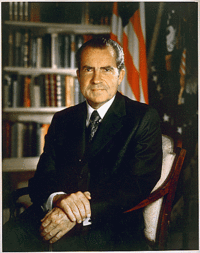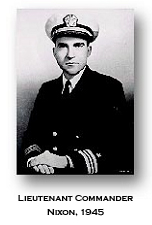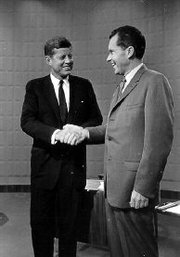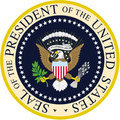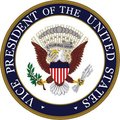Richard Nixon
|
|
| ||
| Order: | 37th President | |
| Vice President: | Spiro Agnew (1969–1973), | |
| Term of office: | January 20, 1969 – August 9, 1974 | |
| Preceded by: | Lyndon B. Johnson | |
| Succeeded by: | Gerald R. Ford | |
| Date of birth: | January 9, 1913 | |
| Place of birth: | Yorba Linda, California | |
| Date of death: | April 22, 1994 | |
| Place of death: | New York, New York | |
| First Lady: | Pat Nixon | |
| Political party: | Republican | |
Richard Milhous Nixon (January 9, 1913 – April 22, 1994) was the thirty-seventh President of the United States, serving from 1969 to 1974. He was also Dwight D. Eisenhower's Vice President (1953–1961). He is the only man to have been elected twice to the Vice Presidency and twice to the Presidency, and he was the fifth Republican President to be elected to two terms. Nixon is noted for his diplomatic foreign policy and moderate domestic policy, but he is also remembered as the first and only U.S. President to have ever resigned from office. His resignation came after a loss of political support in the Congress amidst the Watergate scandal —regarding the improper use of Presidential powers to silence political and legal opposition.
| Contents |
Birth and early years
Nixon was born in Yorba Linda, California on January 9, 1913, to Francis Nixon and Hannah Milhous. He was raised as an evangelical Quaker by his mother, who hoped he would become a Quaker missionary. His upbringing is said to have been marked by such conservative evangelical Quaker observances as refraining from drinking, dancing and swearing.
His father focused on the family business, a store that sold groceries and gasoline. Nixon always spoke highly of his parents. He began his memoirs with the words "I was born in a house my father built." He often spoke lovingly of his mother as a "Quaker saint." Nixon's early life was marked by tragedy in the deaths of two of his brothers, one from cancer and one from a childhood accident.
Nixon attended Fullerton High School, and won an award from the Harvard Club of California as the state's outstanding student his senior year of high school. However, his family was unable to afford his leaving home for college. He instead attended Whittier College, a local Quaker school where he founded the Orthogonian Society, a fraternity that competed with the already established Franklin Society. Nixon then went on to become the student body president of Whittier College. Nixon's chief accomplishment as president was organizing Whittier College's first school dance, forbidden by the Quakers. In 1934 he graduated second in his class, and went to Duke University law school, where he received a full scholarship.
During World War II, Nixon served in the United States Navy. He could have been exempt from military service because of his Quaker religion, but volunteered anyway. He later said he hated Hitler and was horrified by the attack on Pearl Harbor. Nixon served as a Cargo Officer in the South Pacific theater. He rose to the rank of Lieutenant Commander and his superiors praised him as an excellent officer and leader. One interesting footnote about Nixon's Naval career is that he learned to play poker for the first time and quickly became known as the best poker player in the Navy, having apparently won almost $10,000 by war's end. It was in the Navy he met his future friend and Secretary of State William P. Rogers.
Early political career
Nixon was elected to the United States House of Representatives from California in 1946 by beating Jerry Voorhis. The 80th Congress was the first with a Republican majority since the Hoover administration and its freshman class was filled with fellow war veterans, including Nixon's future rival John F. Kennedy of Massachusetts. The campaign he ran against Voorhis highlighted the aggressive campaigning style that Nixon was one of the pioneers of. During a debate with Voorhis he held up members of a Political Action Committee (PAC) that Vooris received substantial campaign donations from. Then he held up a list of members from a Left-Wing PAC with Communist affiliations, and said that, there were a few people who were in both Committees. Nixon said "they're basically the same, if their members are the same..." Although Nixon's allegations were untrue, they succeeded and Voorhis was booed by the crowd.
Pat_and_Richard_Nixon_exit_US_plane.jpg
In the House, Nixon served on a committee that helped to implement the Marshall Plan which aided war-torn Europe. He also helped in the passage of the Taft-Hartley Act which set up controls over labor unions. He proposed a bill to facilitate servicemen's voting that was passed by both houses and signed into law. Nixon climbed the political ladder swiftly, making his name as an anti-Communist and a rough, no-holds-barred campaigner. He became a member of the House Un-American Activities Committee and was instrumental in the trial of State Department Undersecretary and General Secretary of the United Nations Charter meeting Alger Hiss for perjury after the exposure of his activities as a Soviet spy. In 1948, Nixon won both the Republican and Democratic nomination for re-election to the House.
Nixon was elected to the United States Senate in 1950, defeating actress turned congresswoman Helen Gahagan Douglas, whom Nixon accused during the campaign of having communist sympathies. In the campaign the Independent Review newspaper tagged Nixon with the name he would never shake: "Tricky Dick".
Vice Presidency
Eisenhower_68-40-67.jpg
In 1952 he was elected Vice President on Dwight D. Eisenhower's ticket, although he was only 39 years old.
One notable event of the campaign was Nixon's innovative use of television. Nixon was accused by nameless sources of having been financed by a slush fund provided by business supporters. He went on TV and defended himself in an emotional speech in which he stated that his wife Pat did not wear mink, but rather "a respectable Republican cloth coat," and stated that although he had been given a cocker spaniel named "Checkers," he was not going to give it back because his daughters loved it. The "Checkers speech", as it was called, resulted in a flood of support that required Eisenhower to keep Nixon on the ticket.
Nixon was notable among Vice Presidents in having actually stepped up to run the government three times when Eisenhower was ill: on the occasions of Eisenhower's heart attack on September 24, 1955; his ileitis in June 1956; and his stroke in November 1957. He also proved to be able to quickly think on his feet which was demonstrated on July 24, 1959, at the opening of the American National Exhibition in Moscow where he and Soviet leader Nikita Khrushchev had an impromptu "kitchen debate" about the merits of capitalism versus communism.
Although regarded as one of the most intellectual United States presidents, Nixon displayed a somewhat anti-intellectual streak during the 1952 campaign, criticizing the extremely intelligent Democratic presidential nominee, Adlai Stevenson, as an "egghead."
1960 election and post-Vice Presidency
In 1960, he ran for President on his own but lost to John F. Kennedy, ironically a friend of Nixon's (Kennedy, in fact, was one of the first to congratulate Nixon when he was chosen as Eisenhower's running mate). Many observers believe that a crucial factor in his loss was the first televised presidential debate. Despite his five o'clock shadow, Nixon refused television makeup (instead using simple "Lazy Shave" coverup makeup) and was feeling sick, having recently injured his knee while campaigning. Nixon likewise was instructed by CBS television producers to wear a grey suit that blended into the backdrop, whereas Kennedy was told by the same producer to wear a black suit which would stand out when black and white television was the standard. He expected to win voters with his foreign-policy expertise, but people only saw a sickly man sweating profusely and wearing a gray suit that blended into the scenery; while his rival, Kennedy, looked comfortable in his position. It has since been widely suggested, with some support from research, that those who had listened to the debate on radio thought Nixon had won, but that the television audience gave the win to Kennedy. Also, Eisenhower didn't show much support for Nixon, and only reluctantly endorsed him as the Republican candidate at the 1960 Presidential election. Nixon campaigned against Kennedy on the great experience he had acquired in eight years as Vice President, but when Eisenhower was asked to name a decision Nixon had been responsible for in that time, he replied (intending a joke): "Give me a week and I might think of something." This was a severe blow to Nixon, and he blamed Eisenhower for his narrow loss to Kennedy.
On November 7, 1962, he lost a race for Governor of California. In his concession speech, Nixon accused the media of favoring his opponent Pat Brown, and stated that it was his "last press conference" and that "You won't have Dick Nixon to kick around any more." Many mocked Nixon for being a "sore loser" for saying this to the reporters. However, many others praised Nixon for telling the press off. He often said that he never regretted his comments at this famous press conference.
Coincidentally, Nixon was in Dallas earlier on November 22, 1963, the day that President John F. Kennedy was assassinated. Nixon spoke to a meeting of Pepsi-Cola bottlers.
Presidency
Nixon's post-election defeatist mood did not last. He moved to New York City and worked as a prominent lawyer. In the 1966 Congressional elections, he traveled the country, speaking in support of Republican candidates and preparing for another campaign of his own. In the election of 1968, he completed a remarkable political comeback by defeating Hubert H. Humphrey to become the 37th President of the United States. He was the first Vice-President to be elected President who did not succeed the President under whom he had served.
Nixon_meets_Mao_in_China_1972.gif
Nixon appealed to what he claimed was the "silent majority" of socially conservative Americans who disliked the "hippie" counterculture and civil rights and anti-war demonstrators. Nixon also promised "peace with honor," and without claiming to be able to win the war, Nixon claimed that "new leadership will end the war and win the peace in the Pacific." When a reporter pressed Nixon for specifics, he did not reveal any details. Because of this, Nixon's opponents criticized him for not revealing his secret plan to end the Vietnam War, although Nixon had not used this famous phrase. Still, many voters supported Nixon because they believed he would end the war.
He proposed the Nixon Doctrine to establish a strategy of turning over the fighting of the war to the Vietnamese. During the war, on July 30, 1969, Nixon made an unscheduled visit to South Vietnam, and met with President Nguyen Van Thieu and with US military commanders. American involvement in the war ended while Nixon was in office, but only after four more years of strategic bombing and defeat on the ground that led to the withdrawal of US troops, and left the battle to the ineffective South Vietnamese army.
Nixon's administration secretly began a massive bombing campaign in Cambodia in March, 1969 (code-named Menu) to destroy what were believed to be the headquarters and large numbers of soldiers of the National Front for the Liberation of Vietnam. The bombing campaign was kept secret from the American public and the U.S. Congress. Militarily ineffective, the bombing campaigns killed approximately one hundred thousand Cambodian peasants. However, NVA communist forces did use Cambodian soil as a supply line to the Vietcong in the south.
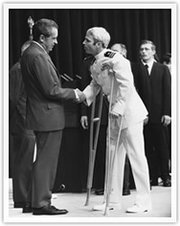
In ordering the bombings, Nixon realized he would be extending an unpopular war as well as breaching Cambodia's "official" neutrality. He also understood that the war was politically un-winnable due to massive demonstrations. Details of the bombing were kept secret even from high ranking officials such as Secretary of State William P. Rogers and the Joint Chiefs of Staff. During deliberations over Nixon's impeachment, his unorthodox use of executive powers over the ordering of these bombings were considered as an article of impeachment, but the charge was dropped. This bombing (and an incursion by US forces into Cambodian territory in April 1970) added to the administration's tacit support for the overthrow of the neutralist royal government of Norodom Sihanouk by the rightist military dictator Lon Nol, created chaos, and drove much of the peasant population of that country into the arms of the Khmer Rouge, a Maoist revolutionary movement that would eventually kill 1.7 million Cambodians after taking power.
On the morning of July 20, 1969, Nixon addressed Neil Armstrong and Buzz Aldrin during their historic moonwalk, live via telephone. Along with those of the astronauts, Nixon's name and signature were inscribed on the plaques left behind by Apollo 11 in 1969 and Apollo 17 in 1972. Ironically it was the Democrat controlled Congress and President Nixon who had wound down the NASA budget and curtailed the Apollo program due to budget pressures caused principally by the vast expense of US involvement in Vietnam. On January 5, 1972 Nixon approved the development of the Space Shuttle program, a decision that profoundly influenced U.S. efforts to explore and develop space for several decades thereafter.
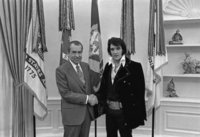
Nixon halted circulation of high-denomination U.S. currency in 1969 by executive order. At the time, he stated that he was taking this action to "make life harder for the Mafia." His comment drew irate criticism from many Americans of Italian ancestry, who regarded it as an ethnic slur.
In 1972 Nixon was re-elected in one of the biggest landslide election victories in U.S. political history, defeating George McGovern and garnering over 60% of the popular vote. He carried 49 of the 50 states, trailing only in Massachusetts.
On January 2, 1974 Nixon signed a bill that lowered the maximum US speed limit to 55 MPH in order to conserve gasoline during the 1973 energy crisis.
On April 3, Nixon announced he would pay $432,787.13 in back taxes plus interest after a congressional committee reported that he had inadvertently underpaid his 1969 and 1972 taxes.
Cabinet and appointments
Watergate
NixonResignationLetter.gif
Nixon_and_Kissinger.png
Nixon-depart.png
Nixon was eventually investigated for the instigation and cover-up of the burglary of the Democratic Party offices at the Watergate office complex, one of a series of scandals involving the Committee to Re-Elect the President (known as CRP but referred to by outsiders as CREEP), which also included the enemies list and assorted "dirty tricks." His secret recordings of White House conversations were subpoenaed, and revealed details of his complicity in the cover-up. Nixon was named by the grand jury investigating Watergate as "an unindicted co-conspirator" in the Watergate Scandal. He lost support from some in his own party as well as much popular support after the so-called Saturday Night Massacre in which he ordered Archibald Cox, the special prosecutor in the Watergate case fired, as well as firing several of his own subordinates who objected to this move. The House Judiciary Committee opened formal and public impeachment hearings against Nixon on May 9, 1974. In light of his loss of political support and the growing likelihood of his impeachment by the House of Representatives and a possible conviction by the Senate, he resigned, effective August 9, 1974.Template:Audio During the Watergate Scandal, Nixon's approval rating fell to 25%, the lowest approval rating for any president.
Nixon's presidency was frequently dogged by Nixon's personality, and the public perception of it. Editorial cartoonists and comedians had fun exaggerating Nixon's appearance and mannerisms, to the point where the line between the human president and the caricature version of him became increasingly blurred. He was often portrayed by these critics and commentators as a sullen loner, with unshaven jowls, slumped shoulders, and a furrowed, sweaty brow. He was also characterized as the very epitome of a "square" and the personification of unpleasant adult authority. Nixon tried to shed these perceptions by staging photo-ops with young people, and even appearing on popular TV shows such as Laugh-In and Hee Haw. He also frequently brandished the two-finger V sign (alternately viewed as the "Victory sign" or "peace sign") using both hands, an act which became one of his best-known trademarks.
Nixon's successor Gerald R. Ford issued a pre-emptive pardon, ending any possibility of indictment.
Later years and death
In his later years Nixon worked to rehabilitate his public image, and enjoyed considerably more success than could have been anticipated at the time of his resignation. He gained great respect as an elder statesman in the area of foreign affairs, being consulted by both Democratic and Republican successors to the Presidency.
Further tape releases, however, removed all doubt as to Nixon's involvement both in the Watergate cover-up and also the illegal campaign finances and intrusive government surveillance that were at the heart of the scandal.
In July 2003, Jeb Stuart Magruder, a former Special Assistant to the President, alleged that Nixon had personally ordered the Watergate break-in by phone. Previously the only guilt that was alleged was his role in the cover up of the break-in.
FordNixonBushReagenCarter.jpg
Nixon wrote many books after his departure from politics, including his memoirs.
While generally in good health, he was on lifelong warfarin anticoagulant therapy after multiple episodes of deep vein thrombosis and pulmonary embolism starting in 1965 (these conditions would later contribute to his fatal stroke). He received surgery in 1974 for this problem (Barker et al 1997).
On April 18, 1994, at 5:45 PM EDT, Nixon suffered a severe stroke while preparing to eat dinner in his Park Ridge, New Jersey home. It was later determined that a blood clot that had formed in his upper heart as a result of his heart conditions broke off and traveled to his brain. He was rushed to New York Hospital-Cornell Medical Center, where his condition deteriorated over the next several days. He might have lived longer had he been resuscitated using extraordinary measures, such as a respirator, but he refused such treatments, as he had stated in his earlier hospital visits. On April 22, he died at 9:08 PM at age 81. He was buried beside his wife Pat Nixon on the grounds of the Richard Nixon Library & Birthplace in Yorba Linda, California. Acting on his family's wishes, Nixon did not receive a state funeral, as customary for former presidents. However, President Bill Clinton, former secretary of state Henry Kissinger, Senate Majority Leader Bob Dole, and California Republican Governor Pete Wilson spoke at the April 27 funeral—the first for an American president since that of Lyndon B. Johnson (a service Nixon himself attended when president) on January 25, 1973. Also in attendance at Nixon's funeral were former presidents Gerald Ford, Jimmy Carter, Ronald Reagan, George H. W. Bush and their respective first ladies. Nixon was survived by his two daughters Tricia and Julie, along with his four grandchildren.
The Nixon Library contains only Nixon's pre- and post-presidential papers, as his presidential papers have been retained as government evidence. Nixon's attempts to protect his papers and gain tax advantages from them had been one of the important themes of the Watergate affair. Due to disputes over the papers, the library is privately funded and does not, like the other presidential libraries, receive support from the National Archives.
Quotations
- "You won't have Dick Nixon to kick around anymore. Because, gentlemen, this is my last press conference." 1962 after losing the race for Governor of California.
- "This is the greatest week in the history of the world since the Creation, because as a result of what happened in this week, the world is bigger, infinitely." (concerning the Apollo Moon landing)
On Watergate
- "I welcome this kind of examination because people have got to know whether or not their President is a crook. Well, I'm not a crook. I've earned everything I've got." November 17, 1973 Televised press conference at Walt Disney World, Florida (perhaps the most frequently satired thing he ever said).
- "I don't give a shit what happens. I want you all to stonewall it, let them plead the Fifth Amendment, cover up or anything else, if it'll save it, save this plan. That's the whole point. We're going to protect our people if we can." (to Haldeman, tapes ordered released for the trial of Haldeman, Ehrlichman and Mitchell)
- "I recognize that this additional material I am now furnishing may further damage my case," (after the ordered release of the White House tapes August 5 1974)
- "When the President does it, that means that it's not illegal." (explaining his interpretation of Executive Privilege to interviewer David Frost)
- "I was under medication when I made the decision not to burn the tapes."
- "Well, I screwed it all up real good, didn't I?"
- "The greatness comes not when things go always good for you, but the greatness comes and you are really tested, when you take some knocks, some disappointments, when sadness comes, because only if you have been in the deepest valley can you ever know how magnificent it is to be on the highest mountain... Always remember, others may hate you. Those who hate you don't win unless you hate them. And then you destroy yourself." Farewell to White House staff August 8 1974.
- "I think that the ability of the American people to review all that there is to know about their president using a microscope is wonderful. Still, I think some people get a little carried away when they take out their proctoscopes." (regarding the intense scrutiny which he was forced to endure.)
On peace
- "Any nation that decides the only way to achieve peace is through peaceful means is a nation that will soon be a piece of another nation." (from his book No More Vietnams)
- "The greatest honor history can bestow is the title of peacemaker." (From his 1969 inaugural; later used as Nixon's epitaph)
Miscellaneous
- "Sock it to me?" (on the television comedy series Laugh-In)
- "I don't know a lot about politics, but I do know a lot about baseball."
- "Solutions are not the answer."
- "I would have made a good pope."
- "Let me say this about that."
- "cookie pushers in striped pants", referring to the Peace Corps and the State Dept. Foreign Service
- "We are all Keynesians now."
Media portrayals of Nixon's life
- The book and movie All the President's Men tell Woodward and Bernstein's story of the Watergate affair.
- Best-selling historian author Stephen Ambrose wrote a three-volume biography (Nixon: The Education of a Politician 1913-1962, Nixon: The Triumph of a Politician, 1962-1972, Nixon: Ruin and Recovery 1973-1990) considered the definitive work among many Nixon biographies. The detailed accounts were mostly favorably regarded by both liberal and conservative reviewers.
- Conservative author Victor Lasky published a book in 1977 called It Didn't Start With Watergate. The book points out that past presidents may have used wiretaps and engaged in other activities that Nixon was accused of, but were never pursued by the press or the subject of impeachment hearings.
- Chuck Colson gives an insider account of the Watergate affair in Born Again
- The movie Nixon directed by Oliver Stone.
- Nixon in China is an opera dealing with Nixon's visit there.
Nixon in popular culture
Simpsons_-_Nixon_Whacking_Day.jpg
Because of his place in American culture as a controversial President, Richard Nixon has appeared as a character (with varying degrees of verisimilitude), both major and minor, in a variety of fiction.
- The Assassination of Richard Nixon
- The Cayman Triangle
- Dick
- Elvis Meets Nixon
- Forrest Gump
- Hot Shots! Part Deux
- Secret Honor
- The Simpsons
- Futurama, where Nixon's preserved head is elected President of Earth.
- Watchmen, set in an alternative reality in which Nixon is still President in the mid-1980s.
- The "alternate 1985" in Back to the Future Part II has Nixon as the President.
Neil Young's song Campaigner has a refrain discussing a place "where even Richard Nixon has got soul".
"The Love of Richard Nixon" is a song by Manic Street Preachers.
Related articles
- U.S. presidential election, 1952
- U.S. presidential election, 1956
- U.S. presidential election, 1960
- U.S. presidential election, 1968
- U.S. presidential election, 1972
- History of the United States (1964–1980)
- Richard Nixon Library & Birthplace in Yorba Linda, California
- Dick Tuck
Bibliography
- Nixon, Richard. (1978). RN: The Memoirs of Richard Nixon (Reprint). Simon & Schuster. ISBN 0671707418.
- Nixon, Richard. (1969). Six Crises. Doubleday. ISBN 0385001258.
- Nixon, Richard. (1980). Real War. Sidgwich Jackson. ISBN 0283986506.
- Nixon, Richard. (1982). Leaders. Random House. ISBN 0446512494.
- Nixon, Richard. (1987). No More Vietnams. Arbor House Publishing. ISBN 0877956685.
- Nixon, Richard. (1988). 1999: Victory Without War. Simon & Schuster. ISBN 0671627120.
- Nixon, Richard. (1990). In the Arena: A Memoir of Victory, Defeat, and Renewal. Simon & Schuster. ISBN 0671723189.
- Nixon, Richard. (1992). Seize The Moment: America's Challenge In A One-Superpower World. Simon & Schuster. ISBN 0671743430.
- Nixon, Richard. (1994). Beyond Peace. Random House. ISBN 0679433236.
History Clipart and Pictures
- Pictures of the US Presidents (http://classroomclipart.com/cgi-bin/kids/imageFolio.cgi?direct=History/United_States/Presidents)
- Clipart of American Presidents (http://classroomclipart.com/cgi-bin/kids/imageFolio.cgi?direct=Clipart/American_Presidents)
- Historical Pictures of the United States (http://classroomclipart.com/cgi-bin/kids/imageFolio.cgi?direct=History/United_States)
- Pictures of the American Revolution (http://classroomclipart.com/cgi-bin/kids/imageFolio.cgi?direct=History/United_States/American_Revolution)
- Civil Rights Pictures (http://classroomclipart.com/cgi-bin/kids/imageFolio.cgi?direct=History/United_States/Civil_Rights)
- Civil War Images (http://classroomclipart.com/cgi-bin/kids/imageFolio.cgi?direct=History/United_States/Civil_War)
- Pictures of Colonial America (http://classroomclipart.com/cgi-bin/kids/imageFolio.cgi?direct=History/United_States/Colonial_America)
- Historical US Illustrations (http://classroomclipart.com/cgi-bin/kids/imageFolio.cgi?direct=History/United_States/Illustrations)
- World War II Pictures (http://classroomclipart.com/cgi-bin/kids/imageFolio.cgi?direct=History/United_States/World_War_II)
- Pictures of Historical People (http://classroomclipart.com/cgi-bin/kids/imageFolio.cgi?direct=History/United_States/People)
External links
- First Inaugural Address (http://www.yale.edu/lawweb/avalon/presiden/inaug/nixon1.htm)
- Second Inaugural Address (http://www.yale.edu/lawweb/avalon/presiden/inaug/nixon2.htm)
- Audio recordings of Nixon's speeches (http://vvl.lib.msu.edu/showfindingaid.cfm?findaidid=NixonR)
- Checkers speech (http://www.watergate.info/nixon/checkers-speech.shtml)
- Articles of Impeachment (http://watergate.info/impeachment/impeachment-articles.shtml)
- Richard Nixon Library & Birthplace, Yorba Linda, California (http://www.nixonfoundation.org/)
- The Nixon Center, Washington,D.C. (http://www.nixoncenter.org/)
- Nixon Presidential Materials at National Archives (http://www.archives.gov/nixon/)
- Political Donations Made by Richard Nixon (http://www.newsmeat.com/washington_political_donations/Richard_Nixon.php)
- Eulogy by Hunter S. Thompson (http://teaching.arts.usyd.edu.au/history/hsty3080/StudentWebSites/Nixon%20Obits/source9)

